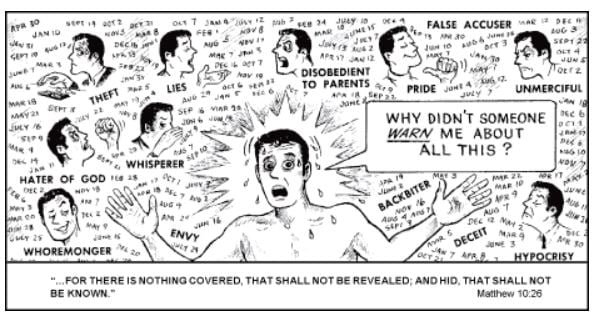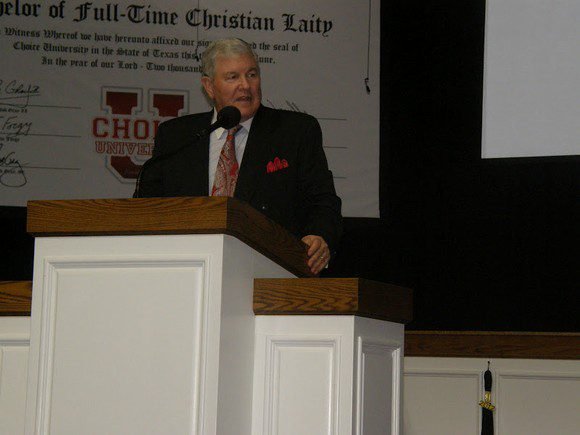
Warning! Snark Ahead!
Armed with certainty, literalism, and an inerrant, infallible religious text, Evangelicals are capable of taking virtually any human behavior and turning it into a “sin.” In a Charisma News article titled Why Many Believers Overlook This Soul-Decaying Idol, Kimberly Wagner says that overeating is sinful, using Romans 12:1,2 as a pretext:
I beseech you therefore, brethren, by the mercies of God, that ye present your bodies a living sacrifice, holy, acceptable unto God, which is your reasonable service. And be not conformed to this world: but be ye transformed by the renewing of your mind, that ye may prove what is that good, and acceptable, and perfect, will of God.
Wagner proceeds to Bible-shame everyone who dares to eat one Twinkie more than necessary to provide their daily energy needs. As Christians often do, Wagner uses her own legalistic struggles with food as justification for scolding those of us who consume more calories than we should. Wagner writes:
One of my friends was sharing why she no longer goes to the race track to gamble. She said, “I never wanted anyone to have anything they saw me do that might detract from my commitment to Christ. I want everything I do to be something that glorifies Him.”
As she was sharing that, all I could think about is how I’ve stopped battling my idol and let it gain mastery over me again. I told her, “If people looked at my eating habits, I would be ashamed. I’m not glorifying God … “
How can I stand and teach the Word, challenge women to live passionately for Christ, when I have this unyielded area in my life? When I’m worshiping at the wrong altar? When I’m indulging in idolatry—feeding my flesh?
Food is not the problem. My heart is.
I love food. I love butter (and lots of it), cream sauce, chocolate, comfort food, creamy food, crunchy food, spicy food, sweet food, salty food, cheesy food, rich food, high-calorie-high-fat food. My love affair with food is unholy.
….
But true enjoyment of God’s gifts comes through the holy practice and consumption of those gifts—not through the perversion of the good. Food is good and necessary. But food can become an idol. I don’t just eat to live—I live to eat!
When I go beyond enjoying food within holy boundaries and indulge my flesh in unhealthy ways, when my cravings drive my decisions and I seek to find satisfaction through my belly, when gluttony becomes my practice, my approach to food is not glorifying God. In fact, it’s idolatry.
Simply put, Wagner’s love affair with food is “unholy” and everyone else should view eating in the manner she has deemed gluttonous in the same way she does. Is it any wonder that Evangelicals are such a fearful, guilt-ridden, unhappy lot? According to Romans 12:1,2, in light of the sacrificial death of Jesus, it is reasonable service to God for Evangelicals to zealously watch what they eat. God can’t be bothered with ending war, feeding starving children, or stopping sexual assaults, but he sure is upset when Brother Baptist and Sister Nazarene eat one too many chicken legs at their church’s monthly potluck. The God who always helps Pastor Bluster find his keys is the same God who counts every carb Evangelicals eat. Imagine a Jack Chick This Was Your Life final judgment where God calls on Evangelicals to account for Snicker bars and Mom’s vanilla wafer-layered banana pudding. I bet that Evangelicals who watch the Food channel are going to be in big trouble with God. How dare they sit around and watch food porn.

Sadly, many Evangelicals miss out on enjoying the fruits of their labors due to Pharisaical condemnations of certain behaviors. The Bible can be used to turn any and every behavior into a sin. Spend enough time listening to Evangelical preaching or reading Christian blogs and you will conclude that Evangelicals have Bible-driven hang-ups about virtually everything they do. Even if a behavior is God-approved, if their attitude or “spirit” is wrong, then that behavior is still a sin. This is why Wagner considers loving food a sin. Yes, humans must eat to live, but to LOVE food means we are turning food into an idol. Colossians 3:5 commands Evangelicals to mortify (kill) their flesh. Numerous Bible verses remind Christians that loving one’s flesh (giving in to human desires) brings judgment and death. Romans 8:8 states that those who give in to fleshly desires cannot please God.
Evangelicals are even commanded to abstain from eating or drinking foods that might cause other Christians to stumble (fall into sin). Romans 14:21 states: It is good neither to eat flesh, nor to drink wine, nor any thing whereby thy brother stumbleth, or is offended, or is made weak. This means that Evangelicals must not only concern themselves with their own desires, but also the desires of other Christians. Can’t eat an extra helping of Granny’s apple pie at the church potluck because Youth Pastor Sinalot has a weakness for pie (and teenage girls). Mustn’t watch anything but Disney movies when Brother Horndog is around. Wouldn’t want him to get sexually aroused. Who knows what he might do if the spirit of lust comes upon him.
The Bible teaches that Evangelicals are to deny self, take up their cross, and follow Jesus. In fact, if Christians really want to show their devotion to God, they should eat just like Jesus ate. That’s right, there is a straight-from-the-throne-room-of-God Jesus Diet. Doctor Oz has an article on his website that lists the foods that Jesus ate:
People back in Jesus’ time ate a mostly plant-based, clean diet. In that region of the world, lentils, whole grains, fruits, vegetables, dates, nuts and fish were all quite popular. For snacks, some even ate grasshoppers and crickets! All these foods provided proper and satisfying nutrition without excess fats or cholesterol.
….
Our longer [digestive] tract, however, allows for more time to process the complex carbohydrates within plants. However, as we eat meat with little fiber, especially red meat, it has a higher chance of getting stuck within our intestines – causing constipation or bloating. In fact, because Jesus and people around Him ate a mostly plant-based diet with little red meat, there’s little mention of “constipation” in the bible [my favorite line].
….
Based on the Bible and historical records, Jesus most likely ate a diet similar to the Mediterranean diet, which includes foods like kale, pine nuts, dates, olive oil, lentils and soups. They also baked fish.
Amazing what you can find in the Bible when you “look.”
And here’s the thing, Evangelicals go through similar Bible gymnastics for other behaviors that have been deemed sins against God. Recently, Calvinists have been fighting amongst themselves over wine, beer, and cigars. One side says that in moderation it is okay to drink alcohol and smoke cigars. The other side says, absolutely not! These substances are “poisons” that harm the body — the temple of the Holy Ghost.
As atheists, we have much simpler lives. We are free to do what we want. While I am not suggesting that it is a good thing to go on a Hostess Ho Ho and beer diet, feeling guilty about overeating or eating the “wrong” (I thought everything was created by God) foods is a waste of time. Life is short, and we shouldn’t spend it obsessing over food. All of us are free to eat however we want. I have friends who are vegans, vegetarians, ethical meat-eaters, and Golden Corral buffet grazers. Each to his or her own. If God is concerned with what I eat then perhaps he shouldn’t have allowed humans to invent such delectable foods. In fact, God should have created our bodies in such a way that we wouldn’t even need to eat, thus eliminating time spent eating and pooping. Imagine how much nicer bathrooms would be without food. No gaseous releases (farts). No turd streaks in the toilet. No more pee on the floor, toilet seat, and everywhere men have been known to splatter. No need for toilet paper either. Think of all the trees we would save!
I wonder if Wagner has ever read Ecclesiastes — you know, the verses that tell us to eat, drink, and be merry, for tomorrow we die. Solomon understood that life is short and the best that man can do is to enjoy the fruit of his labors. And with that in mind, I think I will go and eat another candy bar. I love sinning . . . 🙂
Bruce Gerencser, 66, lives in rural Northwest Ohio with his wife of 45 years. He and his wife have six grown children and thirteen grandchildren. Bruce pastored Evangelical churches for twenty-five years in Ohio, Texas, and Michigan. Bruce left the ministry in 2005, and in 2008 he left Christianity. Bruce is now a humanist and an atheist.
Connect with me on social media:
Your comments are welcome and appreciated. All first-time comments are moderated. Please read the commenting rules before commenting.
You can email Bruce via the Contact Form.







